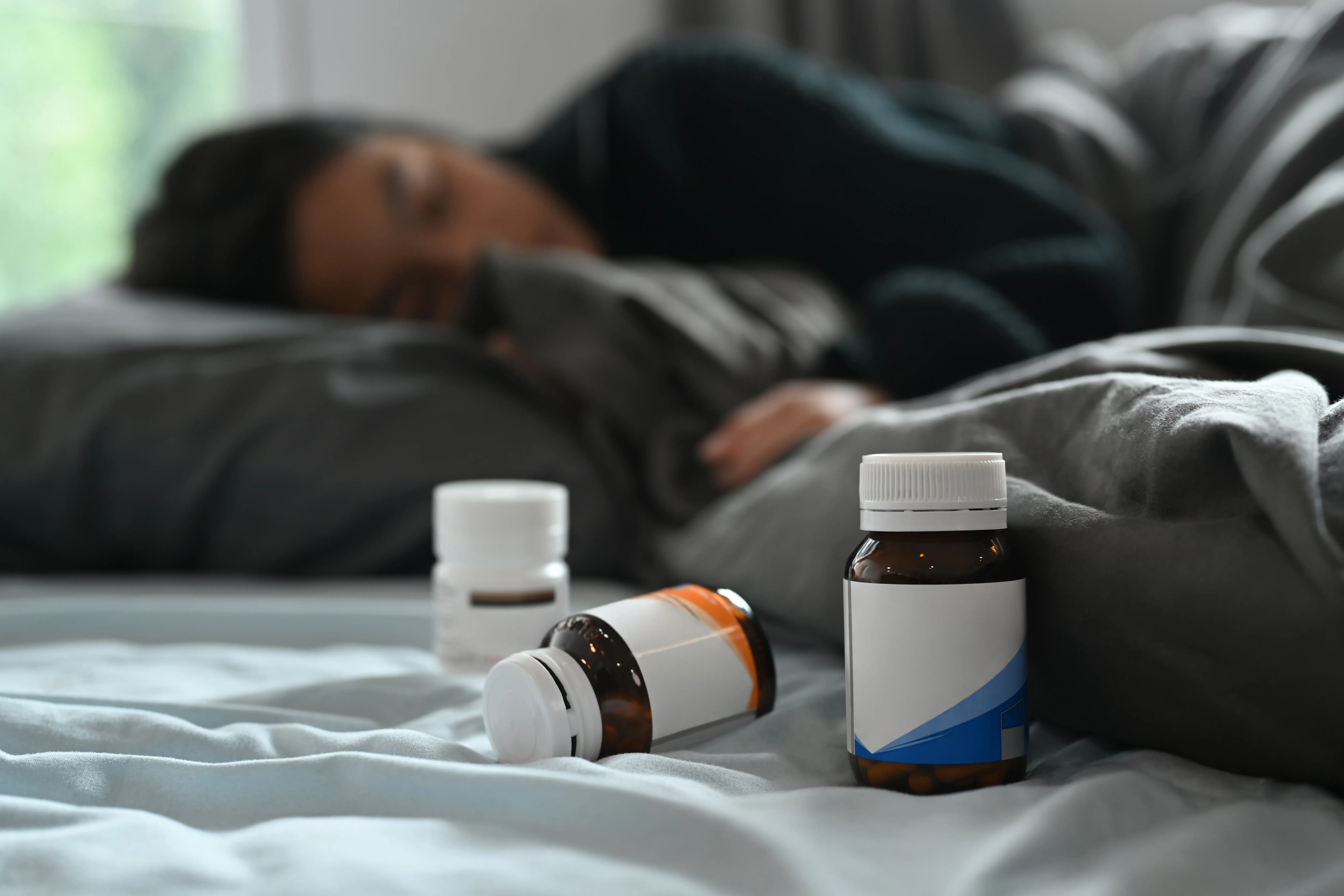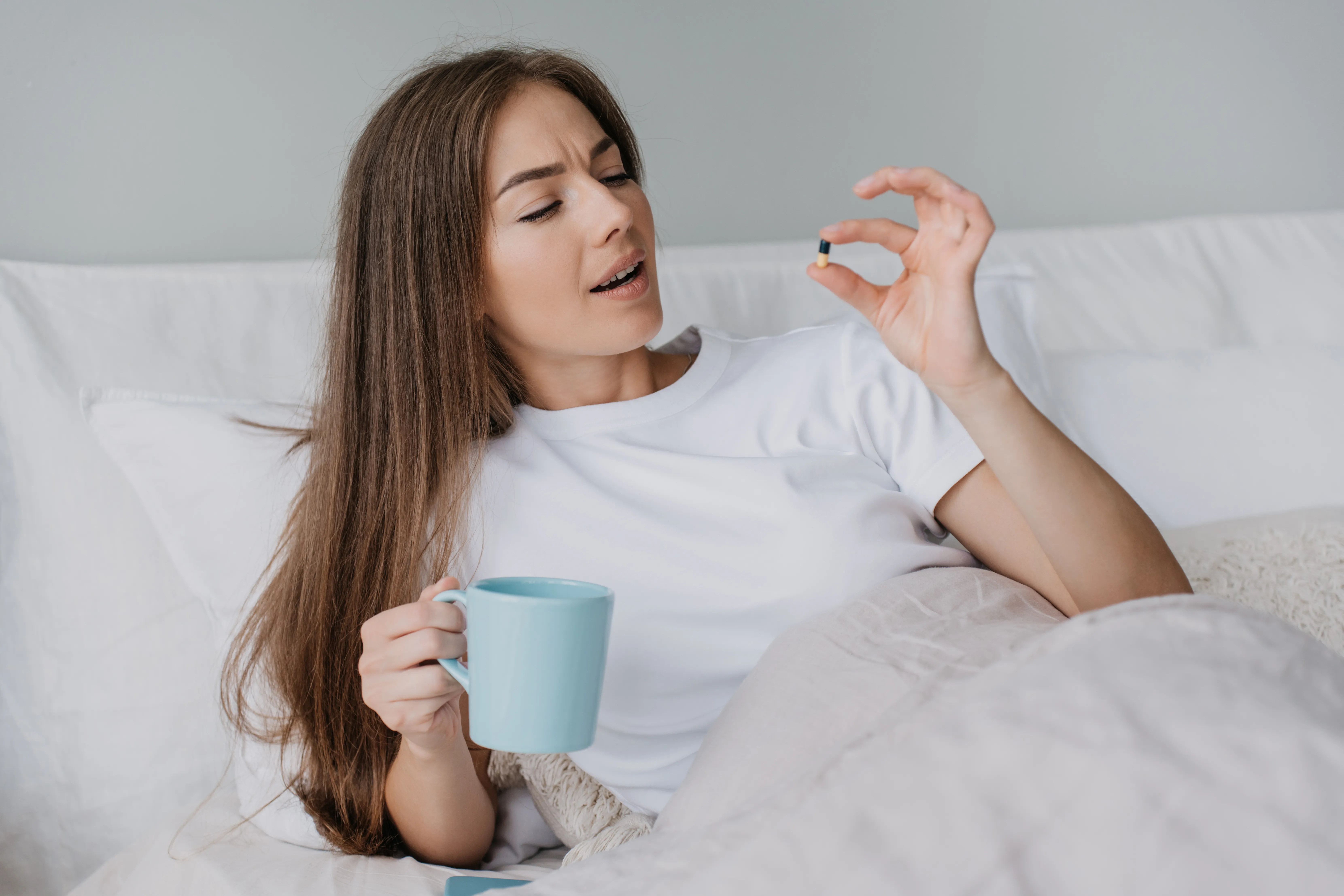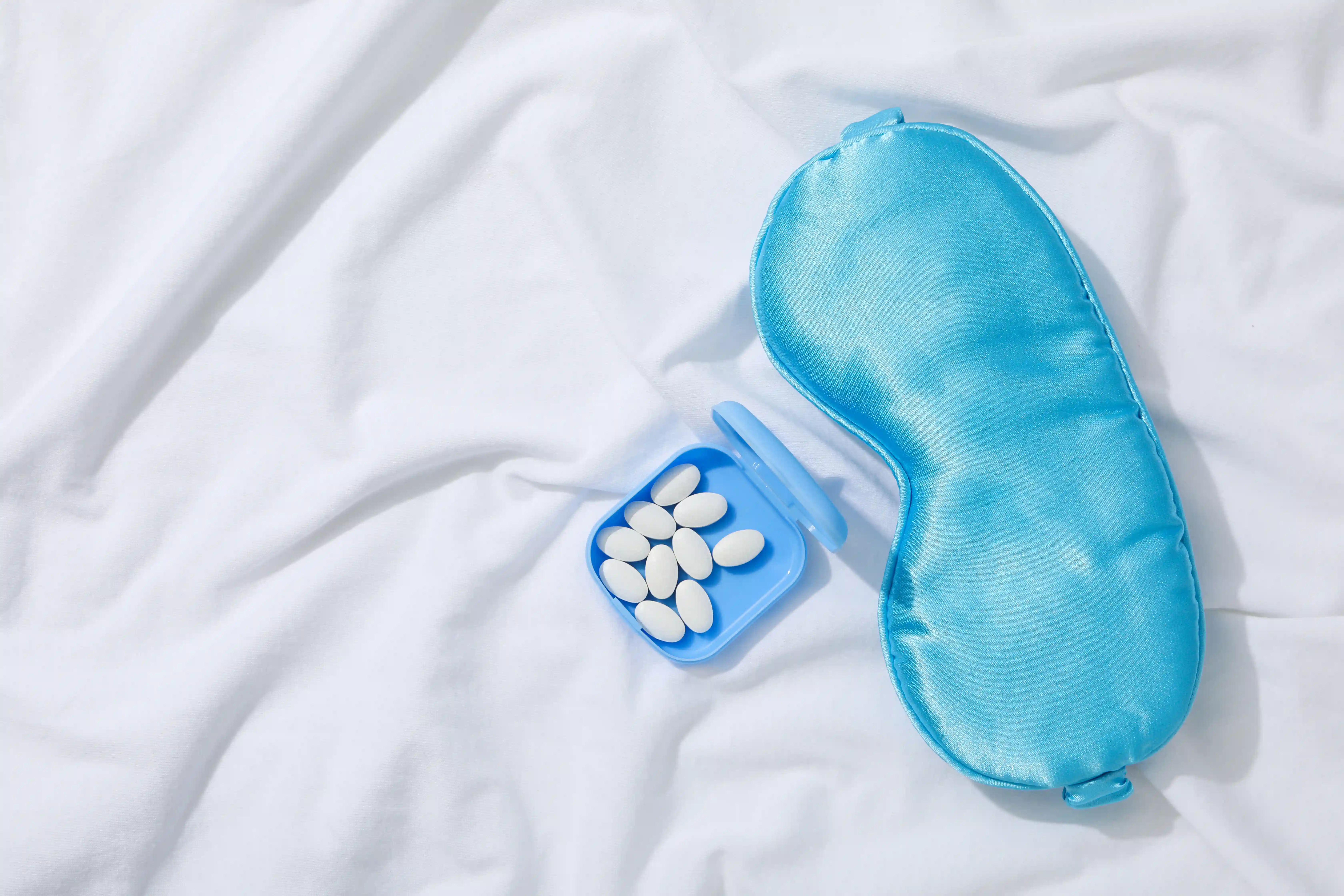Sleep problems affect about a third of people worldwide, and these numbers keep growing each year. You might be looking for sleep aids to sleep better, and GABA could be the solution you haven't tried yet. Studies show that more than 8% of adults rely on sleep medications several times every week, and many don't know about this natural option.
Regular sleep medications might not work for everyone. That's where GABA supplements come in, with daily doses between 100 to 300 mg showing good results for better sleep.
Unlike traditional sleep medications, GABA works in a different way and might not leave you feeling groggy the next morning or risk becoming dependent. Just make sure you know the right way to use GABA safely before you add it to your bedtime routine.
What Is GABA and How Does It Affect the Brain?
Gamma-aminobutyric acid (GABA) stands out as one of your brain's most powerful chemical messengers. GABA acts as the main inhibitory neurotransmitter in the mature central nervous system, unlike others that excite neural activity.
This special amino acid functions as your brain's natural brake system. It slows neural activity and stops your nervous system from getting overwhelmed.
GABA is the brain’s main calming neurotransmitter, reducing excitability by blocking signals in the central nervous system. It works through GABA-A receptors, which let chloride ions enter cells to dampen responses, and GABA-B receptors, which reduce neurotransmitter release.
Acting as the brain’s “off switch” against glutamate’s “on switch,” GABA helps maintain the crucial balance between inhibition and excitation—vital for stable brain function, with imbalances linked to anxiety, insomnia, and epilepsy.
How GABA Supports Better Sleep

GABA does more than just calm your nerves - it helps you sleep better in several ways. Scientists have found that this brain chemical plays a key role in how quickly you drift off to sleep, the quality of your rest, and your body's stress management before bed.
GABA's role in reducing sleep latency
A researcher, Yamatsu, discovered that even smaller doses of 100 mg worked well for people who struggled with poor sleep. These findings appear consistently in many studies, which makes GABA a promising option if you have trouble falling asleep.
Effect on sleep quality and sleep stages
GABA doesn't just speed up your journey to sleep - it shapes your entire night's sleep. It increases your time in Non-REM sleep and makes your sleep more efficient. On top of that, it helps balance both REM and non-REM sleep cycles, with a special boost to deep sleep.
Some studies suggest GABA increases NREM sleep by boosting theta waves. People with insomnia have less GABA than good sleepers, which shows a clear link between GABA levels and sleep quality.
GABA and stress relief before bedtime
Sleep often escapes us when stress and anxiety kick in. GABA helps tackle this nighttime tension head-on. Taking GABA reduces stress and anxiety, setting the stage for better sleep.
GABA helps your body and mind relax enough to fall asleep and stay asleep all night. This double benefit of relaxation and better sleep structure makes GABA a valuable natural sleep aid.
Using GABA safely

You need to understand proper dosages, timing, and potential risks to use GABA supplements correctly.
Recommended GABA dosage for insomnia
GABA dosages between 75mg to 300mg daily help improve sleep. A randomized controlled trial found that 75mg helped people fall asleep faster. Higher doses of 300mg improved both how quickly people fell asleep and their sleep quality.
Start with lower doses around 100mg. You can increase the dose as needed, but don't exceed 750mg in a single dose. The best time to take GABA is 30-60 minutes before bedtime.
How long to take GABA for sleep benefits
GABA's sleep benefits usually last 4 weeks. The evidence shows that GABA supplements need at least a week to affect your sleep.
These supplements are safe to take for up to 12 weeks. You should talk to your doctor if you plan to take doses of 300mg/day or more for longer than 4 weeks.
Common Side Effects
GABA supplements are generally well tolerated; some people may experience mild to moderate side effects. These vary from digestive discomfort to changes in blood pressure and should be monitored closely.
- Abdominal Discomfort: Some individuals report bloating, cramping, or an unsettled stomach after taking GABA. This is often due to the supplement irritating the digestive tract, especially when taken on an empty stomach.
- Headaches: A few users experience mild headaches, which may result from sudden changes in neurotransmitter levels. This effect is usually temporary and subsides as the body adjusts.
- Drowsiness: Since GABA has a calming, sedative-like effect on the brain, excessive intake can lead to grogginess, reduced alertness, or difficulty staying awake during the day.
- Burning Sensation In Throat: Some people feel a slight burning or irritation in the throat after swallowing GABA capsules or powders. This is often linked to the supplement’s formulation or how it is ingested.
- Tingling In Skin: A tingling or “pins and needles” sensation may occur in some users, possibly due to altered nerve signaling caused by increased GABA activity.
- Slight Shortness Of Breath: Though uncommon, some individuals report shallow breathing or mild respiratory changes. This can happen because GABA slows nervous system activity, which may affect breathing patterns.
- Moderate Drop In Blood Pressure: GABA can have a mild relaxing effect on blood vessels, leading to reduced blood pressure. For people already prone to low blood pressure, this may cause dizziness or faintness.
Who Should Avoid GABA Supplements
These groups should be cautious or avoid GABA completely due to potential risks or insufficient research:
- Pregnant Or Breastfeeding Women: There is not enough safety data on how GABA affects pregnancy or nursing, so women in these stages should avoid supplementation. The developing baby may be more vulnerable to changes in neurotransmitter activity.
- People Taking Blood Pressure Medications: Since GABA may naturally lower blood pressure, combining it with prescribed medication could cause blood pressure to drop too low. This can result in dizziness, fainting, or increased cardiovascular risks.
- Individuals Taking Sedatives, Anxiolytics, or Certain Antidepressants: GABA has a calming effect that can intensify the impact of these medications. This may lead to excessive drowsiness, impaired focus, or dangerous levels of sedation.
- Those With A History Of Seizures: GABA plays a role in neural activity, and altering its levels through supplementation may interfere with seizure management. People with epilepsy or related conditions should avoid taking it unless cleared by a doctor.
- Children Under 18: Most GABA supplements are formulated and tested only for adults. Since children’s brains are still developing, supplementing could pose unknown risks to their growth and neurological health.
GABA VS. Other Sleep Aids

While GABA plays a central role in calming the brain and supporting sleep, it’s not the only option people turn to when struggling with rest.
Many natural and synthetic sleep aids work through different mechanisms—some by regulating circadian rhythms, others by enhancing relaxation or directly boosting GABA’s effects.
Comparing these common sleep supports side by side helps highlight how GABA differs from and complements other approaches like melatonin, Glycine, magnesium and valerian root.
| Sleep Aid | How It Works | Pros | Cons / Risks |
|---|---|---|---|
| GABA | Calms the nervous system by reducing excitability and balancing glutamate | Natural, supports relaxation, non-addictive | Limited absorption when taken orally |
| Melatonin | Regulates circadian rhythm and signals sleep onset | Helpful for jet lag, shift work | Can disrupt natural rhythm if overused |
| Magnesium | Supports GABA activity and muscle relaxation | Improves sleep quality, aids relaxation | Excess may cause digestive discomfort |
| Valerian Root | Increases GABA availability and reduces nervous tension | Herbal option, mild sedative effect | Variable effectiveness, possible grogginess |
| Prescription Sedatives (e.g., benzodiazepines, Z-drugs) | Enhance GABA’s effects to strongly reduce excitability | Effective for short-term insomnia | Risk of dependence, memory issues, side effects |
| Glycine | Calms the nervous system and lowers core body temp | Natural, safe, improves sleep quality & alertness | Limited research, mild nausea at higher doses |
FAQs
How effective is GABA in promoting better sleep?
GABA has shown promising results in improving sleep quality. Studies indicate that it can reduce the time it takes to fall asleep, increase total non-REM sleep time, and enhance overall sleep efficiency. However, individual results may vary, and it's best to consult with a healthcare provider before starting any new supplement regimen.
What is the recommended dosage of GABA for sleep improvement?
Clinical studies have found effective GABA dosages for sleep improvement ranging from 75mg to 300mg daily. It's generally recommended to start with a lower dose of around 100mg and increase as needed, not exceeding 750mg per single dose. For optimal absorption, take GABA approximately 30-60 minutes before bedtime.
Are there any side effects associated with GABA supplementation?
While GABA is generally considered safe, some people may experience mild to moderate side effects. These can include abdominal discomfort, headaches, drowsiness, a burning sensation in the throat, skin tingling, slight shortness of breath, and a moderate drop in blood pressure. If you experience any concerning symptoms, discontinue use and consult a healthcare professional.
How long should one take GABA supplements to see sleep benefits?
Most scientific studies on GABA for sleep lasted about 4 weeks. Evidence suggests that you need to take GABA supplements for at least one week to influence sleep. While GABA can be taken safely for up to 12 weeks, it's recommended to consult a healthcare provider if using doses of 300mg/day or more for longer than 4 weeks.
Is GABA safe for everyone to use?
While GABA is generally safe for most adults, certain groups should exercise caution or avoid it entirely. These include pregnant or breastfeeding women, people taking blood pressure medications or certain psychiatric drugs, individuals with a history of seizures, and children under 18. Always consult with a healthcare provider before starting any new supplement regimen, especially if you have pre-existing health conditions or are taking other medications.
Conclusion
GABA emerges as a promising natural solution for people who struggle with sleep problems. This inhibitory neurotransmitter calms neural activity and creates a relaxed state that leads to quality sleep. Research confirms GABA supplements can cut down sleep onset time and might improve overall sleep patterns.
Jessica H.
Jessica is a reviewer, writer, and sleep enthusiast at Sleepiverse. Jessica graduated with her master's degree in Nursing research and education. She is a registered nurse and currently works in the Intensive Care Unit. Since becoming a nurse, Jessica has worked the night shift, which means a disrupted sleep schedule. Knowing she needed to function at her best while caring for patients at night, she spent a lot of time researching how to sleep well with a difficult schedule.


